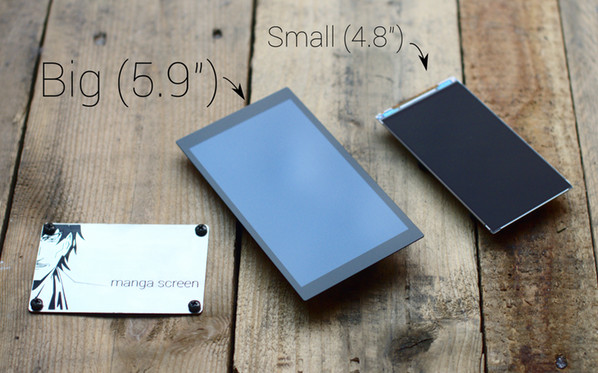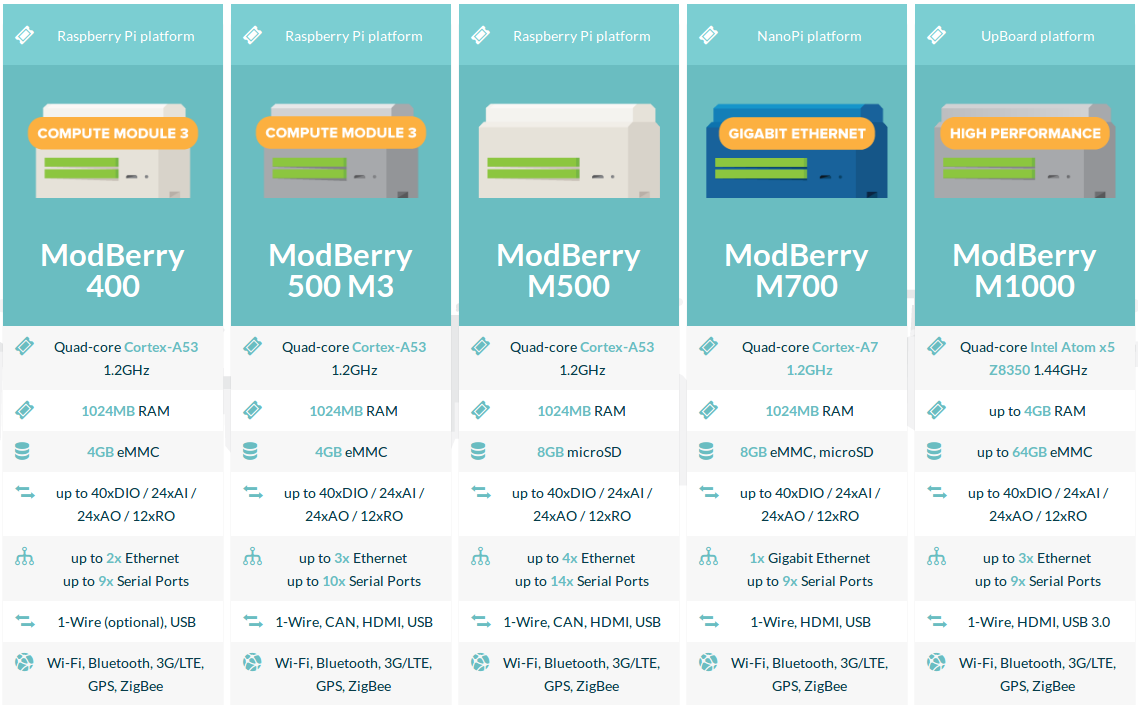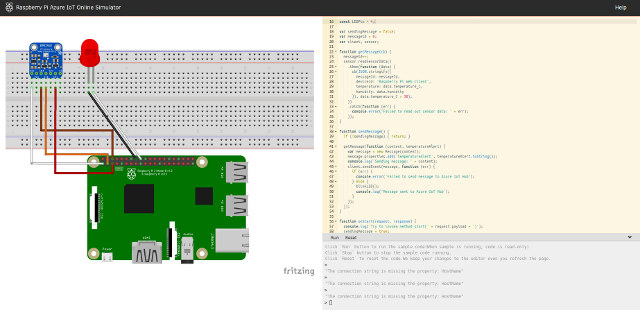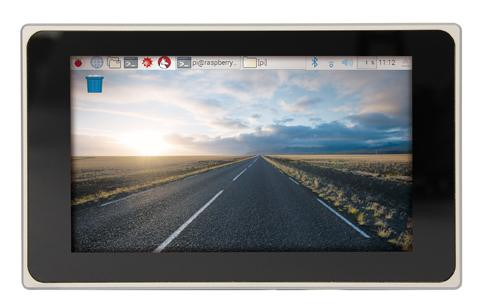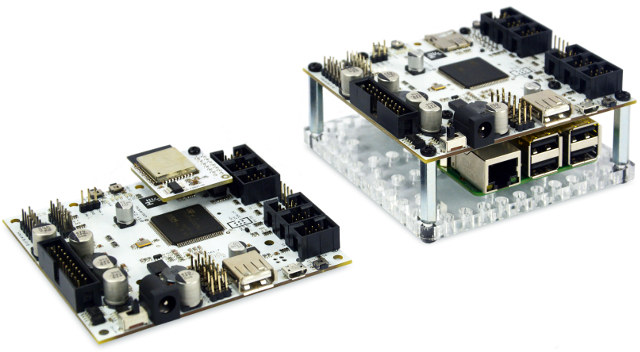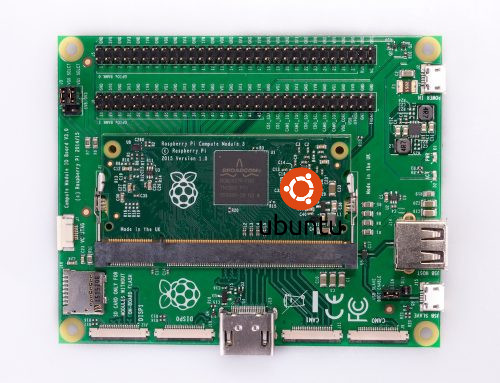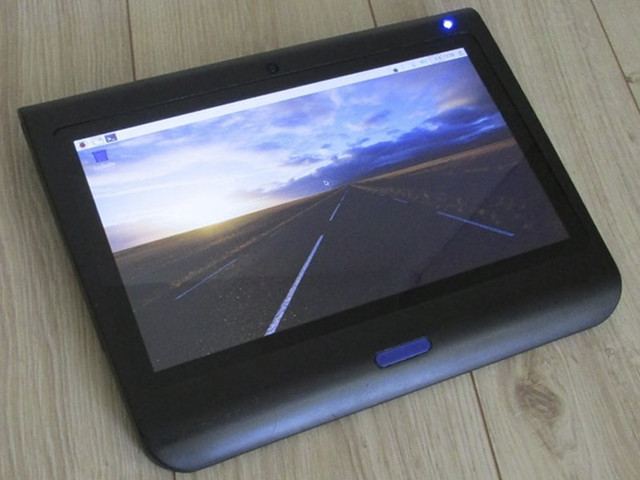Most touchscreen displays aimed to be connected to a development board work through a display interface such as MIPI DSI or LCD RGB (and USB or I2C for touch support), and come with somewhat low resolution such as 800×480 which can be suitable for HMI applications. They also often don’t work with all boards due to the different interfaces used, and there’s no way to easily connect such small display to your computer. Taking those limitations into account, and since most boards and computers come with HDMI and USB ports, Elias Bakken and his team have added HDMI and USB ports to two smartphone displays, and Manga Screen 2 was born. The two displays – made by Sharp – have the following hardware specifications: Big (5.9”) Small (4.8”) Resolution 1920×1080 1280×720 FPS (max) 60 57 Color mode 24-bit PPI 376.2 307.9 Brightness 400 cd/m2 500 cd/m2 Contrast ratio 1000:1 800:1 […]
ModBerry Industrial Automation Controllers Leverage Raspberry Pi, FriendlyELEC, and AAEON Boards and Modules
TECHBASE’s ModBerry Linux based industrial controllers have been around since 2014 with their first model being ModBerry 500 powered by a Raspberry Pi compute module. Over the years, the company has kept adding new ModBerry controllers with now an interesting choice of Raspberry Pi 3 board or compute module, FriendlyELEC’s NanoPi M1 Plus board, or Intel Atom x5 based AAEON’s UP board. All programmable automation controllers (PAC) runs Linux 4.0 or greater, with Debian or Ubuntu Core rootfs including ready tools and pre-compiled packs including C/C++, JAVA, SQL, PHP, SSH, and VPN support. The firmware is upgradeable over the air, and the controllers can run the company’s iMod control software and interface with iModCloud cloud computing service for telemetry, remote control and data sharing. Typical uses include C-L-V functions with conversion to collect and transmit data over communication interfaces, logging via iModCloud or a SCADA, and visualization via a web […]
Microsoft Releases Raspberry Pi 3 Web Simulator Working with Azure IoT Cloud
If you were already following this blog when the first Raspberry Pi launched, you may have tried to emulate a Raspberry Pi and run Fedora in QEMU, as getting a board was a challenge at that time. Microsoft has launched its own Raspberry Pi (3) simulator running in web browsers, connecting to virtual sensors and components using Fritzing, and interfacing with the company’s Azure IoT cloud service. The preview version of the simulator does not allow you customize components on the breadboard, something you’ll be able to do in the release version, so we are stuck with a BMP280 sensor and red LED in the assembly window. on the left. On the top right, we’ve got sample source code written using Node.js to read temperature data from the sensor, push it to an Azure IoT Hub, and blink the LED in the coding area, and finally the integrated console window […]
MASS RPI 07 is a 7″ Industrial Touch Panel PC Based on Raspberry Pi 3
MASS GmbH has launched RPI 07, a touch panel PC with a 7″ 800×480 display powered by a Raspberry Pi 3 board, and designed for industrial applications thanks to a 12V to 24V variable power input, aluminum housing, DIO with optocouplers, an optional CAN Bus and more. MASS RPI-07 specifications: SoC – Broadcom BCM2837 quad core ARM Cortex A53 processor @ up to 1.2 GHz with VideoCore IV GPU System Memory – 1GB LPDDR2 Storage – 16GB micro SD SDHC Class 10 Display – 7″ WVGA 800×480 touchscreen display with 250cd/m² brightness, 500:1 contrast, 10-point touch Connectivity – 1x 10/100Mbps Ethernet, 802.11 b/g/n WiFi and Bluetooth 4.2 LE USB – 4x USB 2.0 Optional Interfaces – Real-time clock (RTC), DIO with optocouplers, I²C, CAN, RS232 Power supply – 12 to 24V DC (15W max) via 2-pin terminal with on/off switch Dimensions – 200 x 118 x 48mm (powder coated metal […]
Husarion CORE2 STM32 Board for Robotics Projects Works with ESP32, Raspberry Pi 3, or ASUS Tinkerboard
Husarion CORE2 is a board designed to make robotics projects simpler and faster to complete with pre-configured software and online management. Projects can start using LEGOs, before moving to 3D printed or laser-cut version of the mechanical parts without having to spend too much time on the electronics and software part of the project. Two versions of the board are available: CORE2 combining STM32 MCU with ESP32 WiFI & Bluetooth module, and CORE2-ROS with STM32 instead coupled to a Raspberry Pi 3 or ASUS Tinkerboard running ROS (Robot Operating System). Both solutions share most of the same specifications: MCU -STMicro STM32F4 ARM CORTEX-M4 MCU @ 168 MHz with 192 kB RAM, 1 MB Flash External Storage – 1x micro SD slot USB – 1x USB 2.0 host port with 1A charging capability; 1x micro USB port for debugging and programming via FTDI chip Expansion Headers hRPi expansion header for CORE2-ROS […]
Canonical Releases Ubuntu Core 16 for Raspberry Pi 3 Compute Module
Now that Canonical has refocused its development efforts on Cloud and IoT, Ubuntu Core has become even more important for the company, which has just released Ubuntu Core 16 for the Raspberry Pi 3 Compute Module, which is better suited for industrial projects than Raspberry Pi boards, for example thanks to the more resilient built-in storage of CM3 module. Ubuntu Core was already supported on Raspberry Pi 2 & 3, Intel Joule, DragonBoard 410c, Intel NUC, and Samsung Artik boards, as well as KVM to run Ubuntu Core in a virtual environment. One of the advantages of running Ubuntu Core is the availability of snaps and branded app stores, making it easy to provide updates, and promote app for the platform. Screenly is one commercial project that will take advantage of Ubuntu Core on CM3 module for their digital signage applications. You’ll find instructions to get started with Ubuntu Core […]
Diskio Pi 13.3″ Touch Panel Display Kit is Designed for Raspberry Pi and ODROID Boards (Crowdfunding)
If your project requires a touch panel, there are plenty of solutions for Raspberry Pi and ODROID boards, with Hardkernel even selling ODROID-VU8C fully integrated touch panel display. However, most display kits require you to make your own case, and feature smaller displays with lower resolution. One developer has however come up with Diskio Pi, a higher-end touch panel kit with a 13.3″ Full HD display that works with the most popular Raspberry Pi and ODROID boards. Diskio Pi specifications: Display – 13.3″ AUO TFT IPS display with 1920×1080 resolution connected via a 30-pin eDP connector ; 330 cd/m2 brightness; 85° viewing angles in all directions. Touch panel – 10-point capacitive touch; G/G structure; USB 2.0 interface; ≥6H surface hardness. Main board: HDMI to eDP driver Stereo sound amplifier USB 2.0 hub with 3x ports: 2x external + 1x internal Battery balance circuit (3S/3S2P) Expansion – Various headers for prototyping […]
IceZero Lattice iCE40 FPGA Board is Designed for Raspberry Pi Zero
Yesterday, we reported about Olimex’s open source hardware iCE40HX8K-EVB board with a Lattice iCE40 (HX8K) FPGA, and today, another iCE40 FPGA board, also open source hardware, appeared in my news feed with Trenz Electronic’s IceZero board specifically designed to be programmed using a Raspberry Pi Zero board. IceZero board specifications: FPGA – Lattice ICE40HX4K with 3520 logic gates, and 80 Kbit memory Storage – SPI Flash for FPGA self-configuration Misc – 3x User LEDs; User Clock: 100 MHz Expansion – 4x unpopulated PMOD Connectors; 40-pin Raspberry Pi female header Dimensions – 56 x 30.5mm (Raspberry Pi HAT Compatible) The board is supported by icoTC open source FPGA toolchain for Windows and Linux, which you can use in Raspberry Pi Zero (W), and other RPi board with a 40-pin header running Raspbian, as explained in that simple example in Github. Trenz electronic only shared part of the documentation, but you’ll find […]


